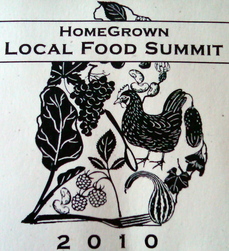Food activists gather in Kerrytown to kick off Local Food Summit

Movers and shakers from Ann Arbor’s local food movement gathered at Eve on Monday night for a mixer and preview of today’s HomeGrown Local Food Summit. The scene was jubilant and electric, as farmers, chefs, merchants and advocates rubbed elbows and exchanged ideas over wine from Cherry Creek winery and delicious food from Eve Aronoff’s kitchen.
Bill Taylor and Scott Aikens, whose Eat Local Eat Natural business was designed to match local farmers with local restaurants and businesses, were busy making connections. “Hey John! Mill Pond Bread is looking for local grains, right? I just found a farmer you need to meet!”
Jennifer Kangas, who raises goats on Capella Farm in Ann Arbor, discussed the need for a nearby (or, better yet, mobile) USDA-sanctioned slaughter facility with Mike Vestergaard, who recently purchased the Frederick Farm on Wagner Road in Ann Arbor to raise grass-fed cattle. Vestergaard, in turn, wondered aloud: “My cattle will be grass-fed and naturally raised. Is that enough? Or will I need to pay to be certified organic? Are people looking for local and humane, or do they need that organic label too?”
Also spotted was Grace Potts, director of the Garden Project at St. Francis Church, which grows organic produce for area needy; Realtor and Ann Arbor City Council member Sandi Smith; Jeff McCabe and Lisa Gottlieb, local food activists and founders of Friday Mornings@Â SELMA; Chef Brandon Johns of Grange Kitchen and Bar; Missy Orge, Director of Outreach and Training for Food Gatherers; representatives from Growing Hope; Kim Bayer of Slow Food Huron Valley; and Mike Perini, host of Pandora’s Lunchbox on WCBN.
The Local Food Summit continues today in the Dana Building on campus, where the discussions that started last night will continue in breakout sessions and committees. The goal of this summit is to work toward The 10% Campaign - a push to increase the percentage of locally-grown food in Washtenaw County. Today, county residents source less than 1 percent of the food they eat locally, but organizers hope that their efforts will be able to increase that to 10 percent, resulting in over $90 million “in new direct economic activity.”
Jessica Webster oversees Food & Drink coverage on the Community Team at AnnArbor.com. Contact her at jessicawebster@annarbor.com.


Comments
Jake C
Wed, Mar 3, 2010 : 12:55 p.m.
To be honest, I'd rather buy a cut of meat from a local farmer's market if I knew that there were only 1 or 2 steps in the distribution chain from the field to me, as opposed to buying some 'USDA-approved' "burgers" from McDonalds that God-knows-what have had done to them... But I do understand why health inspectors and government regulators are in place, to try and prevent unscrupulous people from swooping into a community, offloading a bunch of sub-standard and potentially dangerous meat, and then driving off to the next town with little way to track them down. Here's hoping our local entrepreneurs can find the best of both worlds! Though I hope slaughtering animals on the full- or new-moon isn't part of the requirements, as that's just silly.
Jennifer Kangas
Wed, Mar 3, 2010 : 8:43 a.m.
Even a mobile processing facility would be great (not USDA-sanctioned). I don't really understand why it's OK to sell a whole animal to an individual, which they then take to a local processor, but it's not OK for us to take the animal to a local processor and then sell cuts of meat. There are a lot of people who want some meat but don't have the space to store a whole pig or 1/4 cow or a goat. There are some great, small, local processors that aren't USDA certified and I think we need to support them - maybe one could get a mobile truck out to some of the farms. In the end, I don't get an extra degree of comfort solely from the USDA stamp. But I do find comfort in at least meeting the guys that are processing and caring for our animals in the time they're waiting to be processed.
sandy schopbach
Tue, Mar 2, 2010 : 4:53 p.m.
Friends I had in the Massif Central in France raised a pig every year. They had it slaughtered by a butcher who drove from one farm to the next and "did the dirty deed" for all the farmers, and helped them make the sausages, salamis and pts. I remember learning that he was really rushed because pigs were only slaughtered pigs full moons (or new moons). My friends poo-poo-ed the idea, being newly arrived from Paris to start this goat cheese farm, so the first year he told the butcher that it didn't matter to him what moon it was. All the meat went bad. The next year, he had it done on the correct moon phase, like everyone else. I don't understand, but it seems to be a legitimate concern. But I digress. My friends didn't sell to others; here the idea is to sell to consumers. So the idea of a mobile USDA-sanctioned slaughter facility seems an excellent one. I have no idea how feasible it is, but someone should check it out.